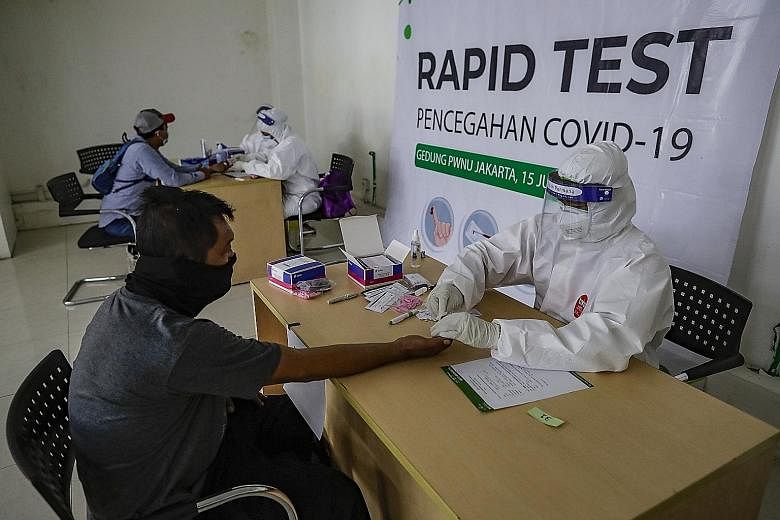JAKARTA • Indonesia's widespread use of rapid antibody tests for Covid-19 as requirements for various activities during the pandemic has sparked concerns among experts, who are calling for better government control over their use.
Post-market surveillance on rapid antibody test brands carried out by the Association of Indonesia's Clinical Pathology and Laboratory Medicine specialists (PDS PatKLIn) showed that many of them had sensitivity and specificity lower than 50 per cent, association chairman Aryati said.
"With low sensitivity, chances of false negatives are high... while with low specificity, chances for false positives are high," Professor Aryati, who is from Surabaya's Airlangga University, said.
The country's Covid-19 task force has recommended 155 brands from various producers as of April 28. The team said it had referred to a list issued by the World Health Organisation (WHO) and products certified by bodies such as the European Union and the United States Food and Drug Administration.
The WHO did not endorse the brands, but rather, inventoried lists from national regulatory agencies.
Although the test kits' varying quality was the main problem, Prof Aryati said the absence of training for laboratory workers and how they carried out the tests also affected the tests' accuracy.
She pointed to examples of how an incorrect volume of samples taken, prolonged time to interpret the results and the sampling of capillary blood rather than venous blood could lead to erroneous results.
Many of those who had "non-reactive" test results - indicating no virus exposure - also did not take another test within 10 days after the first one, contravening prevailing protocol, Prof Aryati said.
The PDS PatKLIn issued a recommendation on July 6 for the Covid-19 task force not to require rapid tests for travellers, saying the possibility of false negatives and positives "could have dangerous and harmful impacts".
It also recommended against requiring polymerase chain reaction (PCR) tests as its sensitivity was only between 60 per cent and 80 per cent, and the time between taking samples and announcing results could be as long as three weeks.
The Covid-19 task force had on June 26 issued a circular requiring people travelling domestically by land, sea or air to present proof of negative PCR or non-reactive rapid test results that are valid for 14 days.
The PDS PatKLIn instead recommended using rapid molecular tests PCR or antigen tests with samples taken from travellers at ports prior to departure, checking their body temperature and oxygen saturation, as well as ensuring other health protocols and clean air circulation on board.
Prof Aryati said she hoped the government would use a recent Health Ministry study on the accuracy of rapid tests and her association's post-market surveillance research to further shortlist test kits allowed to be distributed, as opposed to what she described as current "lax regulations".
"My concern is not only the transportation. There are also rapid test requirements for some participants of the state university entrance exams, or people willing to return to offices. I think it is concerning and unnecessary," Prof Aryati said.
Even though rapid antibody tests are not used for diagnosis, they have now become a common requirement for some activities in Indonesia. Some hospitals have also used the tests to screen patients.
Rapid tests could aid contact tracing and surveillance efforts, but the absence of regulations on who or which entities can administer the tests is a problem, according to epidemiologist Tri Yunis Miko from the University of Indonesia.
"There should be regulations overseeing facilities that offer rapid tests. All hospitals and clinics can offer such a service now, even small clinics, as long as they have medical staff," he said.
THE JAKARTA POST/ASIA NEWS NETWORK











